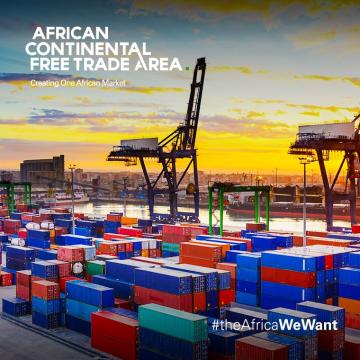Eastern and Southern Africa Regional Business Councils on the AfCFTA Approved… rhetoric to action in carrying out the Trade Deal
By Abdul Rahman Bangura–

Photo Credit: African Union
NEW AFRICA BUSINESS NEWS (NABN) Freetown, Sierra Leone – Africa Continental Free Trade Area (AfCFTA) was ratified in 2018, in Kigali Rwanda and 44 African member nations approved to carry out the deal as a path to smudge into the landmass’s trade chances and strengthen intra-Africa trade towards attaining the AU
development agenda 2063.
It started formally in January 2021 with only 36 nations (to date) been eligible to ratify and place their instruments of AfCFTA ratification with the African Union Commission (AUC).
In a bid to move the agenda forward, each regional bloc in Africa was commissioned to form a Regional Business Council (REC) and it’s right nations that have been created, comprising the Eastern and Southern Africa REC tripartite- which centralizes the East African Business Council (EABC), Common Market for Eastern and Southern Africa (COMESA) and Southern African Development Community (SADC).
However, six African nations, including Rwanda have been selected to captain regional trade in selected goods, one of the major challenges is that a multitude of trade instruments had not been completed.
Officeholders announced, there has been no effort on the consequences of the 1st coordination conference of the Heads of Regional Economic Communities on the implementation of AfCFTA held in September 2021, in Accra-Ghana. Moving from paperwork to action, the regional tripartite which met in Kigali from 10th –11th August, 2022 acknowledged the function of private sectors in implementing the deal and came up with strong suggestions on how to move forward.
These encompass giving birth to an Action Plan for Collaboration between the RECs Business Councils on capacity building of the private sector to participate in the AfCFTA initiatives, create joint coordination on the sensitization of the private sector to benefit from the opportunities presented by the AfCFTA, and establishing engagement mechanism between African Business Council and the RECs Business Councils.
The latest issue was the most controversial facet as tripartite members fluctuated on whether to push their own tripartite council or form a new Africa continental tripartite council compliance in mind that, there is an African Business council- which is acknowledged by AU but not a legal entity.
Dennis Karera, EABC Vice Chairman and AfCFTA Focal Point Rwanda announced, the regional business body can construct a continental council that is assertive and thorough.
“I don’t see why we cannot start this process now, so as to have a council that is inclusive and representative of all legally recognized regional business councils,” Karera said.
“The longer we wait the more room we are going to create for other organizations to pop up. Otherwise some Asian will come and create a group that we don’t know.”
However, Dickson Poloji – CEO of COMESA Business Council told that they don’t want to commence a fight with the prevailing Africa Business Council. Africa has a market of 1.3 billion consumers with a total Gross Domestic Product (GDP) of more than $2.6 trillion and $80 billion in intra-Africa exports.
The World Bank foresaw economic windfalls of full AfCFTA enactment by 2035 to a 7% real income gain ($450 billion), 29% boost in volume of exports, and 81% improvement in intraAfrican trade, lifting over 60 million from poverty. The first phase of the AfCFTA was thought to see commission of trade in goods and services, setting statutes and the protocols on the settlement of disputes, tariff concessions, specific commitments for trade in services, and rules of origin.
Nevertheless, with 70% of intra-regional trade potential, Karera challenged why the SADC bloc doesn’t trade much with the East but relatively craves the Western.
“We need to see the role of the private sector without delay. Why is it that we still have trade barriers, closed air spaces in the region?”
